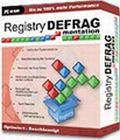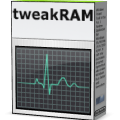Ogni giorno offriamo programmi GRATUITI che altrimenti dovresti comprare!

Giveaway of the day — Registry Defragmentation 9.1
Registry Defragmentation 9.1 era disponibile come app gratuita il 25 agosto 2009!
Registry Defragmentation è una piccola utility in grado di migliorare enormemente le performance del computer. Essa provvede infatti a deframmentare fisicamente i file che compongono il registro di sistema e ad organizzarli secondo una struttura lineare. Un programma indispensabile per chi installa/disinstalla programmi con una certa frequenza.
"Registry Defragmentation" deframmenta fisicamente i file che compongono il registro di sistema e li organizza secondo una struttura lineare che velocizza l'avvio delle applicazioni e l'accesso alle varie chiavi. Inoltre, il programma rimuove tutte le voci inutilizzate del registro, riducendo le dimensioni di quest'ultimo. Non abbiate paura se qualche volta le dimensioni del registro diminuiscono solo dell'1-5%, quella che determina le prestazioni della macchina è la struttura del registro, non il su peso.
The current text is the result of machine translation. You can help us improve it.
Requisiti di Sistema:
Windows 95/98/ME/NT/2000/XP/2003 and Vista
Produttore:
Elcor SoftwareHomepage:
http://www.elcor.net/rdefrag.phpDimensione File:
3.37 MB
Prezzo:
$11.95
Programmi correlati

Riparate il registro ed incrementate le performance del vostro PC! Il vostro sistema è diventato incredibilmente lento e instabile? Avete bisogno di un software professionale per pulire e riparare il registro. Advanced Registry Doctor è la risposta!

Premium Booster è un potente kit di strumenti per l’ottimizzazione del PC con delle funzioni uniche. Esso controllerà il vostro sistema per riparare eventuali ostacoli alle prestazioni di Windows.

TweakRAM è creato per pulire la memoria dei computer. E’ in grado di ottimizzare la RAM e rendere i computer veloci e senza crash.
GIVEAWAY download basket
Commenti su Registry Defragmentation 9.1
Please add a comment explaining the reason behind your vote.
The Good
* Easy to use.
* Works quickly.
* Can backup and restore registry.
* In-house ability to create and use System Restore points.
* Has a scheduler to allow you to automate tasks.
* Did not mess up my computer after a defrag.
The Bad
* No "analysis" report prior to actual defragmentation.
* Does not warn you to close all programs before you defrag.
* Scheduler is set to run automatically at boot by default.
* Registry backup files are not self-executing (you must have a program that supports the backup format to restore your registry).
* Opens a website in your browser advertising another product during installation.
* Mentions it is for "95-XP" some places and "XP-Vista" other places.
Free Alternatives
TuneUp Utilities 2008 ("TuneUp Registry Defrag" module)
For final verdict, recommdendations, and full review please click here.
Since the website says next to nothing, I read Ashraf's review. I'm giving the same advice I give for most tools which mess with the registry--stay far away from them.
The registry is a specialized database which Windows uses, primarily for Windows and program settings, but applications have been known to put all kinds of stuff in the registry which they aren't supposed to. It's the absolute worst idea which Microsoft ever came up with, apart from Windows itself. The idiots at Microsoft claim that the common database was supposed to provide for ownership and access control, but it fails miserably at both of those. Don't believe me? If there's access control, why are applications allowed to screw up critical registry entries for Windows and other applications? If there's ownership, why does uninstalling programs leave tons of their crap behind in the registry? The whole thing's a fiasco. The issue of ease of application portability (or lack thereof) is actually a very minor issue compared to the rest.
Based on what Registry Defragmentation 9.1 says it does and what Ashraf's review says it does, its documentation is extremely misleading. The registry consists of files, the physical fragmentation of those files is one thing. The registry is a database, the internal structure and fragmentation of the database entries within the physical files is another matter. It's primarily the second issue which Registry Defragmentation addresses, although it implies the first.
I don't care that some people will claim that they've "been using registry tools since they were knee-high and never had a problem". It's an extremely simple matter to determine that the registry is constantly in-use. While there are tools which will track all registry access, both reads and writes, what's relevant are actual changes over time. There are a number of registry snapshot tools, I use a licensed copy of Blue Project SysTracer Pro, an earlier version of which was a previous giveaway. If you take two snapshots over a couple of minutes and compare them, you'll see that all sorts of stuff has changed. Trying to terminate running applications is insufficient. Any utility which modifies the registry as a whole while Windows is running is going to mess stuff up, whether you notice it or not. Such utilities, if used, must be run prior to Windows boot, which Registry Defragmentation 9.1 doesn't do.
There are the issues about whether internal or external registry defragmentation should be done at all. The big-name disk defragmenters (Raxco PerfectDisk, Diskeeper, O&O Defrag, etc.) are all capable of handling the physical defragmentation of the registry and other system files safely. I doubt that they do the internal defragmentation of the database structure, but it's unnecessary, as Windows (at least XP and higher) will handle that automatically as-needed. Unlike Registry Defragmentation 9.1, there are other utilities which will do the internal database defragmentation prior to Windows boot.
Some people are big fans of registry backups. I'm definitely not a fan of all-or-nothing registry restoration, it's guaranteed to screw things up whether you notice or not (again, do traces on a running system and see how much changes, and how rapidly, and don't forget files and the registry have to be kept synchronized). Moderately safe things to do include System Restore (XP and higher), and when desperate, Use Last Known Good Configuration. I do occasional "backups" via SysTracer snapshots. Those let me examine what's changed and specifically select the individual items which I want to restore.
- "Registry Defragmentation is a small utility that does gigantic improvements in computer performance"
Yah, just run it 10 times and presto - your computer is 10 times faster. What a load of rubbish!
The facts are : Most registry optimization programs give very minor (if any) performance improvement. Registry operations, after all, are not the most frequent operation. The registry is a database used to store static date that may fragment over time. Most programs when starting-up do look up some values in the registry, and may also store some values when exiting.
The registry may acquire "holes" when deletes are done, as when one uninstalls a program. But it would require a hell of a lot of such operations to unbalance it so that the difference becomes noticeable. Shrinking the size of the registry by x percent doesn't mean at all that performance is improved by x percent, far from it. The improvement from defragmentation is usually measured in nanoseconds and is really unnoticeable and not worth the risk of rendering the computer unbootable. And no reason to do this more than about once a year.
I really dislike companies trying to profit from the non computer savvy and using scarecrow claims that have no validity at all.
More everyday free alternatives that never time out:
* Free Registry Defrag (can analyze first):
http://www.registry-clean.net/free-registry-defrag.htm
* NTREGOPT (get ERUNT with it to make a backup first):
http://www.larshederer.homepage.t-online.de/erunt/index.htm
The Registry is a dark and densely packed shedful of gelignite.
You may wish to walk into it holding a lighted candle in order to see what's on the shelves and how best to tidy 'em.
Whether or not you walk away unscathed is another matter, because the hot wax dripped by your candle may very well trigger a slow burn rather than an instant explosion.
So although the shed is still intact after your visit, and all your poking around / tidying of its contents, that's actually no guarantee at all: it could blow up in your face some time afterwards.
Though today's ultra-hyped software offering assaults the intelligence with claims of 'gigantic improvements' -- gigantic? What's that then, a factor of 10? 100? 1,000? -- it's ultimately no different to any other app ever marketed: the user must trust in the skill of the creator and hope that there aren't hidden flaws in the build.
Doing that with the non-critical may, just, be OK. But trusting to luck with something as critical as the computer's registry is faith at its most blind.
Reassurance does of course exist where an app has been around a long time -- for example, the freeware optimiser NTREGOPT, as notable for the way it shuns commercial hype as the way it has evolved and been refined thanks to feedback from users worldwide.
Similar reassurance also exists in the form of Revo Uninstaller, which does a great job in cleaning up Registry detritus after every uninstall anyway.
Today's software also seeks to provide that same reassurance too -- yet I don't know what happened to all the preceding versions, even though by implication there must've been a heck of a lot for this ever to have reached the status of build number v9.1.
Nor is it clear why, after all those successive builds, this software continues to be entirely incapable of reporting on the 'state' of the Registry before it even gets to work on it.
Doesn't it know? Can't it tell?
It certainly should, because only a fool consents to surgery without advance diagnosis.
Thanks, then, GOTD, but where today's software is concerned, a definite no thanks.
Whatever version it truly happens to be.


Salve a tutti, sono nuovo ed è la 1° volta che scrivo qui. Per deframmentare il reggistro di sistema provate Quicksys RegDefrag che è Free e una volta installato lo si può copiare in qualsiasi pennetta USB e usarlo in altri PC senza installarlo di nuovo.
Il link è questo: http://www.regdefrag.com/download.
Save | Cancel
Dopo che avari usato vista per una 1 anno e 1/2 mi dirai. LOL
Save | Cancel
Sono entrambi poco utili da Vista in poi: le prestazioni non aumentano in maniera percepibile.
Save | Cancel
Fate come volete, ma ERUNT per backup di soli file di registro e la sua deframmentazione (completa riscrittura in maniera continua) è il migliore. Chi continua a dire cavolate sul defrag dei file di registro se li vada a studiare, perchè è sempre un'operazione pericolosa, mica è il defrag dei file di HD. Ciao.
Save | Cancel
@ andrea: spero che tu usi la versione PRO di advanced system care, per la free non è free adware
http://www.softpedia.com/get/Tweak/System-Tweak/Advanced-WindowsCare.shtml
Passa a trovarmi quando vuoi CERBOTTO, sono una delle ragazze americane che hai incontrato oggi sulla spiaggia.
Facciano tutte le DRAG QUEEN
Save | Cancel
Io adopero "advanced sistemcare"della iobit anche questo programma fa i backup,e lo si può usare tranquillamente perche se non hai smanettato il programma ti dice semplicemente che è tutto a posto.Non capisco tutte le perplessità ad adoperare certi programmi,dimenticavo è free e multilingue compreso l'italiano
Save | Cancel
@ CERBOTTO: okkio che loro ti credevano americano e tu le "credi" donzelle...attento che poi magari sotto hanno un..."big mac" ;-)
Save | Cancel
@Cerbotto ecc.ecc.
....e siamo tutti contenti per te, così avrai qualcosa di più importante da fare che spappolare la palle a noi.
Save | Cancel
Hi folks! Hello everybody!
This is Cerbotto, SPECIAL ONE and KING OF GIVEAWAY!
Non sono d'accordo con chi dice che è inutile e addirittura DANGEROUS deframmentare il registro. Io direi che è fondamentale eseguire questa operazione almeno una volta al mese per avere il pc veloce e scattante come nuovo... questo software va più che bene anche se REGOPT è un'eccellente FREE ALTERNATIVE.
Io ho un pc del 2003 ed è una skeggia... ovvio, sono un Geek, lol!
Quindi, THUMBS UP from Cerbotto for this software, but it's better REGOPT, and it's free!
PS: per vostra informazione, ieri in spiaggia ho conquistato ben 3 donzelle grazie al mio INCREDIBLY FLUENT ENGLISH... pensate che alla fine erano convinte che io fossi amerikano grazie alla mia PRONUNCIA PERFETTA.. ho dovuto faticare non poco per convincerle ke ero italiano! Impresa mitica che solo Cerbotto puo' compiere, LOL!!!
Ma che ve lo dico a fare a voi che a mala pena riuscite a dire "MY NAME IS" ???
CHEERS from Cerbotto, the King of Conquistadores!!!!
ENJOY!!!!!!!!!!!
Save | Cancel
Chiedo scusa se mi prolungo ancora:
Chi deframmenta il Registro lo fa perchè installa e disinstalla parecchi software, quindi ha una sua giustificazione farlo. Chi, alcontrario non smanetta con installazioni e disinstallazioni o comunque non smanetta tanto lo può usare ma con MOLTA, MOLTA moderazione tipo una volta al mese o una volta ogni due mesi per intenderci.
Save | Cancel
Concordo con IO: http://www.regdefrag.com/download-registry-defrag
Lo uso da tre anni ma, fate sempre ATTENZIONE quando maneggiate programmi di questo tipo. Non è mai semplice identificare quale applicazione e migliore di un'altra. Quicksys RegDefrag crea Backup quindi...
Grazie Popof, sei sempre troppo buono :)
Comunque terminerò tra breve la pagina sul Registro di sistema e...
AA, hai ragione :)
Save | Cancel
Ma guarda chi si revede!!
I nostri vecchi amici POPOF e SOLITOANONIMO, membri onorari del CLUB DELLA CERBOTTANA!!!
LOL!
Save | Cancel
QUICKYS REGDEFRAG.FREE IN ITALIANO.Non fa danni l'ho uso da sempre utile se non si formatta spesso.
Save | Cancel
OT
@ Popof: ancora casini? Allora ci si aggiorna altrove:-)
cuao
end OT
Save | Cancel
Grazie Totonno!!!! :) sto di nuovo nei guai! ti spiego tutto "altrove"
Scusate l'OT ma come potevo non salutare Totonno???
P.S. alla luce delle dritte di Totonno, io passo: meglio evitare l'uso di SW così rischiosi se non si hanno ancora le capacità per gestirne appieno l'utilizzo.
Save | Cancel
Ci sono voci del registry che non possono essere deframmentate per quanto ne so.
A parte questo, nessuno ha dato un'occhiata al sito del produttore?
Io mi fido poco, vende anche Xpy Shield Gold che se lo conosci lo eviti.
In ogni caso faccio notare che un deframmentatore del registry è presente anche in Glary Utilities (sia la free sia la pro)
Io come - Popof ben sa - utilizzo Macecraft JV 16 PowerTools 2009, che però non è gratis.
Per rispondere a Popof: sì, se mantieni il sistema stabile e pulito da virus e spyware, puoi fare benissimo a meno di programmi del genere.
@ Popof: come va vecchio bolscevico? ;) Ti ho risposto altrove
Save | Cancel
@Nato Libero
complimenti per il tuo sito: vi sono rientrato dopo parecchio tempo e ho subito notato grandi miglioramenti.
Insomma, morale della favola, per un utente medio/basso sconsigliate l'uso di un programma che effettui deframmentazione del registro di sistema? Il PC vive bene anche senza?
Save | Cancel
per "Nato Libero, Morirò da Schiavo":
No, impara TU a leggere... "regedit" serve a visualizzare il registro, come il blocco note serve a visualizzare i file di testo. Se elimini il blocco note [cosa che ho fatto per sostituirlo con Notepad2 (sourceforge . net/projects/notepad2/)], non è che tutti i file .txt che hai sul computer spariscono...
Certo, il registro è una cosa diversa, ma, se cerco "regedit.exe" nel disco C:, ne trovo 5: in C:\WINDOWS\, in C:\WINDOWS\$NtServicePackUninstall$, in C:\WINDOWS\I386, in C:\WINDOWS\ServicePackFiles\i386 e infine in C:\WINDOWS\system32\dllcache.
Se li elimino tutti contemporaneamente (altrimenti li copia da un'altra cartella) e poi faccio start > esegui > regedit, mi dice che non riesce a trovare il file... Ma il registro è ancora al suo posto e funzionante! Oh, ma guarda!
E poi, ti pare che Windows possa lasciare che il registro venga cancellato così facilmente, visto che sarebbe anche un file in uso?
Save | Cancel
Impariamo a leggere AA
http://numerico.altervista.org/Registry_e_struttura.htm
Sempre per l'anonimo AA: almeno sai a cosa serve il registro? eliminare il regedit?
Prova a tirare via la candela dalla macchina e poi dimmi se va lo stesso!.
Ero di passaggio e ora torno a lavorare che è meglio... maaaaaaaa
misteri della vita.
Save | Cancel
Ho cercato un po' su internet, sono riuscito a capire che il registro di windows è contenuto in alcuni file senza estensione in C:\Windows\System32\Config e in NTuser.dat. "regedit" visualizza solo in modo leggibile da un essere umano quelle informazioni; quindi, regedit.exe si potrebbe anche eliminare, ma il registro continuerebbe a funzionare. Quello del commento n°4 evidentemente non lo sapeva...
Comunque, questo programma deframmenta i file del registro, che come ogni altro file tendono a frammentarsi, visto che vengono aggiunti e rimossi dati in continuazione. Non va a smontare tutte le chiavi di registro e ricostruirle in un altro ordine, o almeno credo...
Insomma, NON è un'operazione pericolossissima che può distruggere per sempre il PC.
Alla fine l'ho provato, e in 3 minuti e 43 secondi ha deframmentato i circa 70 mb del registro. Poi ho riavviato, come consigliato dal programma, e mi è parso che il riavvio ci abbia messo 10-20 secondi in meno del solito, ma per il resto direi che è tutto uguale a prima.
Save | Cancel
Vero, proprio perchè è una cosa molto pericolosa il defrag del registro (che con la console msdos si fa) è molto pericolosa e molti software lo ricostruiscono con errori.
L'unico testato e da me fidato è erunt che fa backup con allegato il file ntregopt che ricrea il registro (no win 9x.
Ottimo il defrag dei file defragler e JkDefragGUI, ma il migliore in assoluto e a pagamento è:
Raxco PerfectDisk
E' in grado (al riavvio) di ricreare e deframmentare la parte MFT della partizione NTFS (l'unico che ce la fa, l'altro famoso Diske... NO), deframmenta i metadata ecc... cosa che i defrag free lo sognano, ma è caro.....
Save | Cancel
Già, io preferisco non sottolineare la deframmentazione del regedit perchè è importante tenerlo integro. Programmi che vanno ad intaccare il regedit alla lunga non lo migliorano, se mai sbucano come funghi errori ono dietro l'altro. Ci sono programmi anche non free che svolgono queste funzioni come TuneUp. Ognuno faccia quello che crede...
Ho voluto menzionare Defraggler perchè molti sono sempre alla ricerca di un buon software per la deframmentazione, gratis e possibilmente in italiano.
Save | Cancel
Scusa MaoMao, ma ERUNT mi sembra che salvi soltanto la copia del registro senza deframmentare niente.
Save | Cancel
Hai toppato. LOL
Quì non si parla di defrag dei file, ma di defrag di registro, ricompilazione e riscrittura per renderlo più fluido e leggero.
E' un'operazione MOLTO pericolosa e l'unico programma di cui mi fido è ERUNT (free) se volete, provate questo e ditemi. :)
Save | Cancel
1.Carino come giocattolo ma, se volete una utily gratuita per deframmentare in modo davvero ottimale e gratuito il mio suggerimento è Defraggler http://www.defraggler.com/ . Per utenti che non conoscono l’inglese faranno un bel sospiro perchè esso è in lingua italiana. Mentre per la pulizia non esiste miglior tool se non CCleaner h ttp://www.piriform.com/
Save | Cancel